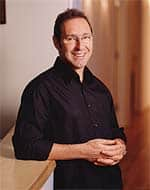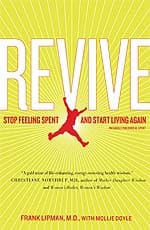Life Extension Magazine®
“Being a holistic physician involves more than simply treating illness,” says New York City internist and acupuncturist Frank Lipman, MD. “My practice also encompasses looking at the patient within the greater patterns of nature’s rhythms and how their lifestyle meshes or clashes with those rhythms.” The author of Total Renewal: 7 Steps to Resilience, Vitality and Long-Term Health (2003), Spent: End Exhaustion and Feel Great Aging (2009), and the newly published paperback Revive, Dr. Lipman is also the founder of Eleven Eleven Wellness Center in New York City. A trim, brown-haired man whose steady gaze regularly morphs into infectious smiles, Dr. Lipman specializes in treating those who despite being apparently healthy and in the prime of life, are chronically feeling overwhelmed and exhausted. “When prompted correctly, our rhythms and body clocks can reset because the body moves naturally towards healing if you give it a chance.” Lipman refers to this condition as “spent” syndrome. “Other symptoms include apathy, depression, insomnia, brain fog, lowered immunity, inexplicable physical aches and pains, and digestive problems.” These conditions are the body’s way of telling us that we are mentally, emotionally, and physically depleted, he ventures. As he notes in his new book, Revive, “Our bodies were not built to be sedentary nor run marathons into middle age. Moreover, government research shows that most Americans are chronically sleep-deprived, which is causing untold number of illnesses,” Dr. Lipman asserts. Additionally, “Humans were never meant to live without sunshine or eat a diet of processed foods, as so many Americans do.” Noting that we evolved as omnivores, Dr. Lipman says, “Our bodies and minds can never be adequately nourished from fat-free or carb-free diets.” On top of that, “Given our wired, and increasingly wireless world which creates a 24/7 information overload, our brains and bodies rarely have a chance to recover from daily mental and emotional stress.”
The standard American lifestyle runs counter to what our bodies need to function in a balanced way, Dr. Lipman asserts. “Human bodies are designed to eat natural and seasonal foods from our nearby environs, and to exercise in spurts that follow the pattern of exert, rest, recover, exert, etc. We are meant to have fresh air, sun, and water. We are built to sleep when the sun goes down, and wake when it rises. Fortunately, when prompted correctly with natural light and good food at the correct time, the right supplements, appropriate exercise, and exposure to nature, our genetic clocks can reset themselves.”
Toward that end, Dr. Lipman’s treatment regimens comprise acupuncture, herbs and nutritional supplements. “I work with several associates, and our focus is on preventive health care and patient education,” Lipman says. “We work to get people healthy and help them thrive by using various non-invasive modalities and drug free techniques such as customized diet and supplement regimens; detox, acupuncture, physical therapy, chiropractic and lifestyle management.” Although Dr. Lipman tries to avoid pharmaceuticals, he notes, “I do prescribe them when necessary, after holistic approaches have been ruled out.” A big believer in exercise as an alternative to anti-depressants, Dr. Lipman says, “Restorative yoga can be very beneficial and it’s very easy to get into and out of the poses.” Lipman’s approach to healing mind/body conditions has garnered many culturally influential patients, including fashion designer Donna Karan, actress Gwyneth Paltrow and Island Records founder Chris Blackwell, who brought the music of Cat Stevens, Bob Marley and the Wailers, U2, and other superstars to international audiences. The husband and wife acting team of Kevin Bacon and Kyra Sedgwick are also patients. They credit him with helping them maintain optimum health despite demanding work schedules, jet lag and other health challenges. “Frank Lipman has been our trusted friend and doctor for more than 15 years,” they say. “Time and time again, Frank has helped us to restore our bodies to their natural rhythms and health.”
One of the many ways Dr. Lipman helps patients perk up is by having them cut out caffeine in favor of energy-enhancing supplements such as acetyl-L-carnitine. “Many people need caffeine every day to wake up so that’s a problem for their bodies,” he says. “If you have caffeine every now and then, that’s OK, but caffeine can tax the endocrine system which results in tiring the adrenal glands, body and mind,” he says. “I recommend 1-2 grams twice a day of acetyl-L-carnitine for menopausal women and men aged 50 and over.”
“When people reach age 70,” he continues, “I generally become more conservative with doses, so for people 70 and over, I would recommend just 1 gram twice a day.” He’s also a stickler for testing to discover any potential vitamin and mineral deficiencies. “Seventy percent of my practice is comprised of female patients,” he notes. “It is not uncommon for their blood tests to show deficiencies in vitamin D. I tell all my patients that there is much persuasive evidence-based medical research suggesting that calcium and vitamin D work synergistically to provide optimal potential clinical benefit to bones and the rest of the body.” (See sidebar for Dr. Lipman’s extensive personal supplement regimen.) A longtime Life Extension® reader, he says, “I’ve learned a lot over the years from reading the medical research that is discussed in the magazine, and I take some of the Life Extension® supplements, as well.” An ex-South African who was born and raised in Emmarentia, Johannesburg, Dr. Lipman trained as a medical doctor in various hospitals in South Africa, and in (then) homelands such as KwaNdebele, before settling in New York. “My wife and I immigrated to the USA and settled in New York City because we could no longer continue living under the racist Apartheid regime,” he says. He completed a three-year residency in Internal Medicine and for a number of years after that immersed himself in the study of Chinese medicine, functional medicine, nutrition, meditation and yoga. When Lipman opened Eleven Eleven Wellness Center in Manhattan in 1992, “I had a broad understanding of the strengths and weaknesses of my Western training. And I had a fund of knowledge thanks to other medical systems I’d been studying. I felt ready to treat people scientifically yet holistically with various modalities.” By the mid-1990s, however, Dr. Lipman noticed that more and more male and female patients reported feeling exhausted, depressed, overwhelmed, achy, and older than their years. “These people were eating ostensibly good diets and exercising, yet they were sleeping poorly,” he recalls. “They complained of low or no sex drive and were running on empty. I labeled this “syndrome” “SPENT,” and I believe that whatever you call it, many of us are feeling mentally and physically spent. Although Western medicine offers Prozac® and other potential panaceas, “many physicians fail to recognize that this epidemic exists,” Lipman says. Pondering the files of spent patients, it soon occurred to Lipman that the only time he never saw folks with these symptoms was when he was working as a doctor 28 years ago in KwaNdebele, a rural area in South Africa. “I saw many diseases stemming from physical hardship, poverty, poor hygiene, and malnutrition,” he recalls. “In KwaNdebele, there was no electricity, indoor heating or refrigeration. But people went to bed when it got dark, rose with the sun and ate only those foods that were in season. They lived in harmony with the rhythms of nature. Although desperately poor,” he reflects, “my South African patients lived nature-based lives, which seemed to confer certain health advantages that many of my New York patients never enjoyed.” Dr. Lipman credits what he learned from studying Chinese medicine (that humans live in the natural world and are governed by the forces of nature) as helping him pinpoint the origins of his spent patients’ problems. “Human bodies are creatures of their environments and are subject to the dictates of cyclical rhythms,” he asserts. “Since these rhythms are fundamental elements of nature’s self-organizing dynamic, I looked for scientific research documenting the relationship between natural rhythms and health.” Fortuitously, he found research in the field of chronobiology, the science that examines cyclical phenomena in living organisms. “I was fascinated by the fact that the body runs according to more than 100 circadian rhythms,” he says. “These are based roughly on nature’s 24-hour cycle, influencing different aspects of your body’s function, including sleep and wake cycles, body temperature, hormone levels, brain wave activity, heart rate, blood pressure and even pain threshold. These rhythms also influence moods, and as I explain in Revive, our internal body clocks are set precisely to these rhythms and cycles of nature. “For most of us, the only time we become aware of our body’s internal rhythms and their importance is if and when we have jet lag after traversing a few time zones. With jet lag, you get tired easily, feel sluggish, you have trouble concentrating or thinking clearly, your body aches, you have trouble sleeping and you may even have digestive problems,” Dr. Lipman says. “But unlike when you are spent, after a few days of jet lag, your body clock adjusts to the new time zone and you start feeling better.” According to Dr. Lipman, “When prompted correctly, our rhythms and body clocks can reset because the body moves naturally towards healing if you give it a chance.” When our rhythms are in sync, we have more energy, everyday tasks are easier to perform—things just seem to unfold effortlessly.” By making small but important lifestyle changes, (see sidebar Reset Your Body Clock to Revive and Thrive), Dr. Lipman says, “You’ll soon feel more energetic, start sleeping better and reclaim your birthright of vibrancy and happiness.” For more information about Dr. Lipman, visit www.drfranklipman.com.
|



